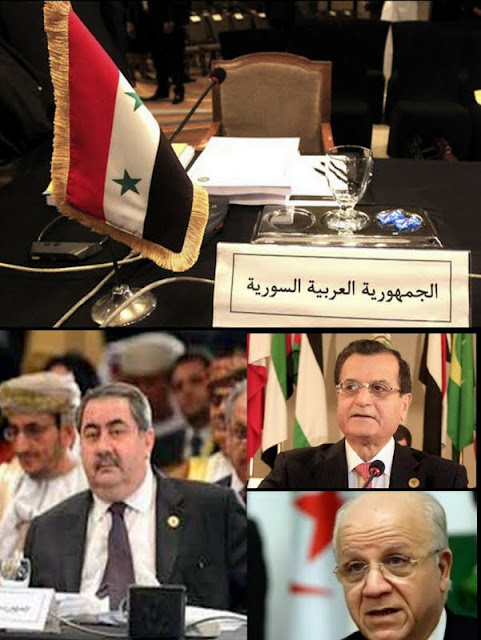 |
| Syria's empty Arab League seat (top) and three dissenters, clockwise from R.:Medelci, Zibari and Mansour |
Each of the 22 Arab League member states is now free
to offer military aid to the Free Syrian Army (FSA) fighting forces loyal to President
Bashar al-Assad.
The 22-member bloc also wants the Syrian National
Coalition of Revolutionary and Opposition Forces “to form an executive body to
take up Syria’s [Arab League] seat” and represent Syria at the impending Arab summit
in about three weeks.
The
league suspended Syria's membership in November 2011 after the Assad regime failed
to abide by an Arab peace plan that sought to end the conflict.
Meeting in Cairo yesterday, the Arab League Council
of Foreign Ministers resolved:
1. To reaffirm recognition of the Syrian National
Coalition of Revolutionary and Opposition Forces as the sole representative of
the Syrian people and the chief interlocutor with the League of Arab States.
2. To invite the Syrian National Coalition of
Revolutionary and Opposition Forces to form an executive body to take up
Syria’s seat at the Arab League, plus its organizations, councils and branches,
and to participate in the upcoming two-day Arab League summit to be held in
Doha on March 26-27. That will be the case until an elected government assumes
office in Syria. This [decision] is in recognition of the Syrian people’s
sacrifices and extraordinary circumstances.
3. To reaffirm continuation of the quest for a
political solution to the Syrian crisis and to uphold the right of individual
member states to offer, as they choose, all means of self-defense -- including military
– to prop up the steadfastness of the Syrian people and Free Syrian Army.
4. To convene an international conference at the UN for
rebuilding Syria.
The resolution carried three footnotes.
One said Algeria expressed a reservation on the
second article.
Another said Iraq took issue with the second and
third articles.
The last said Lebanon “dissociated” itself from the
resolution altogether.
Algeria, Iraq and Lebanon were represented at the
meeting by their respective foreign ministers – namely Mourad Medelci, Hoshiar Zebari and Adnan Mansour.
Syria’s own foreign ministry reacted by restating its
"rejection of any role for the Arab League in a peaceful resolution
of the crisis in Syria," accusing the League of being hostage to Qatar and
Saudi Arabia and manipulated by the "monarchies of money, oil and
gas."
Lebanon’s
al-Akhbar, which speaks for Assad and Hezbollah, said “العرب للسوريين: اقتتِلوا” --
i.e. the Arabs effectively tell Syrians to keep up their
internecine warfare.
Al-Akhbar
commentator Hassan Olayk
separately defends Adnan Mansour, who represents the Shiite Amal Movement in
the Beirut government. Olayk says the Lebanese foreign minister simply called
for peace in warmongering times championed by oil-rich kingdoms.
By
contrast, Rajeh
el-Khoury, who writes for Lebanon’s independent daily an-Nahar, wonders: “Are we in the Republic of Lebanon or the independent
Republic of Adnan Mansour, who yesterday stood at the Arab League and talk as
if he were the foreign minister of Syria and Assad’s spokesman?”
The
Arab League met in Cairo on the same day the UN refugee agency was saying the
number of Syrians who have fled their war-ravaged country and are seeking
assistance has now topped the one million mark.
"With
a million people in flight, millions more displaced internally, and thousands
of people continuing to cross the border every day, Syria is spiraling toward
full-scale disaster," the UN High Commissioner for Refugees, Antonio
Guterres, said in Geneva.
The
Syria conflict is also depriving hundreds of thousands of children of their education.
Among findings in an education assessment conducted
by UNICEF and released this week:
- At least 2,400 schools have been damaged or destroyed, including 772 in Idlib (50 per cent of the total), 300 in Aleppo and another 300 in Deraa;
- Over 1,500 schools are being used as shelters for displaced persons;
- More than 110 teachers and other staff have been killed and many others are no longer reporting for work. In Idlib, for example, teacher attendance is no more than 55 per cent;
- In Aleppo, children attendance rate has dropped to as low as 6 per cent.
Syria
healthcare system has also collapsed, according
to medical charity Médecins Sans Frontières (MSF).
MSF said in a report published today that hospitals,
doctors and patients had come under direct attack, and many trained medical
staff had fled abroad.
One-third of public
hospitals are no longer functioning and healthcare has been forced underground,
MSF said in a summary by the BBC .
The charity has more
than 200 staff working in rebel-held areas of Syria.
It said repeated
requests to the government for wider access had not been granted.
Despite its limited
access, the charity said it had carried out more than 20,000 consultations and
1,560 surgical procedures since the start of the conflict in March 2011.
It has also opened
three hospitals in opposition-held northern regions.
But MSF said the
conflict had "made a mockery of the concept of healthcare".
"Medical aid is
being targeted, hospitals destroyed and medical personnel captured," said
MSF's Dr Marie-Pierre Allie.
The exodus of trained
medical staff had left inexperienced workers trying to provide care, the
charity said.
"Dentists are
performing minor surgeries, pharmacists are treating patients and young people
are volunteering to work as nurses," the report said.
Doctors had been labeled
"enemies of the state" for treating the injured and both sides were
now using hospitals as a war strategy, MSF said.
While government air
raids targeted medical facilities, the rebels had begun to label their
facilities "Free Syrian Army hospitals", increasing the
risk of attack.
Increasingly, medical
care has been forced underground, with makeshift hospitals set up in caves,
homes and farms.
But
MSF says these facilities are still being targeted in air raids.

